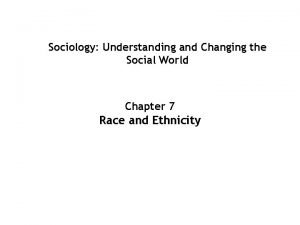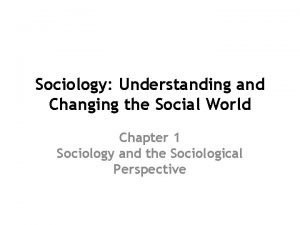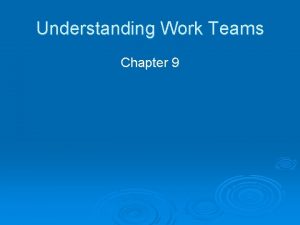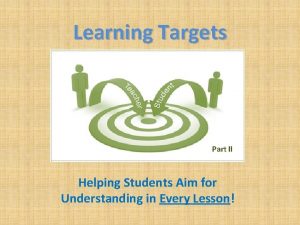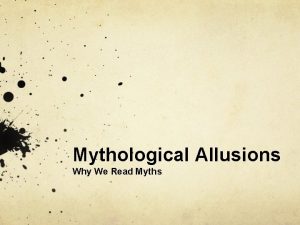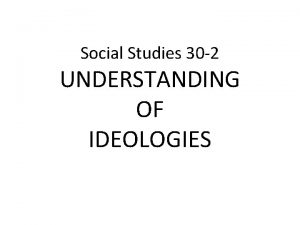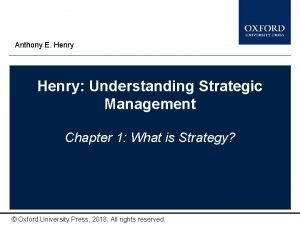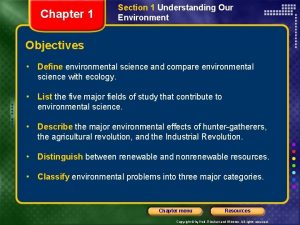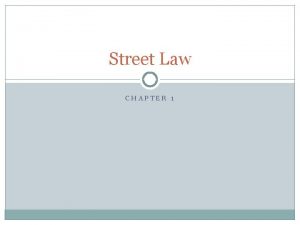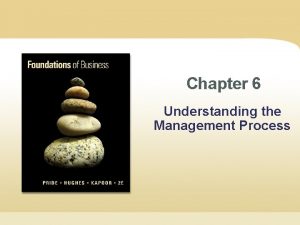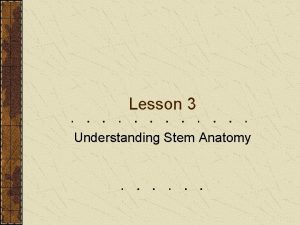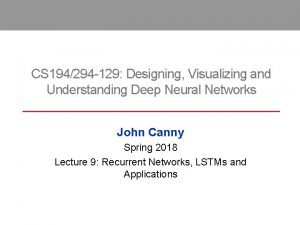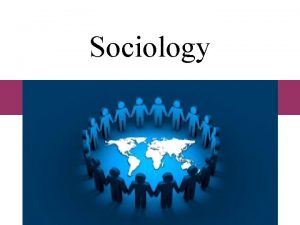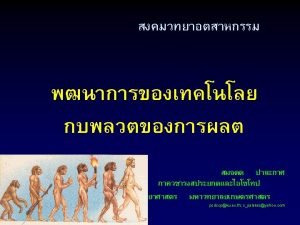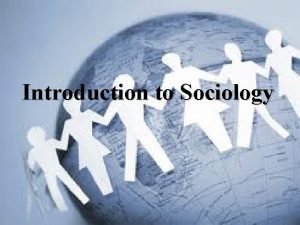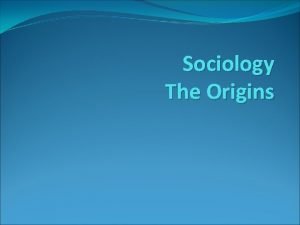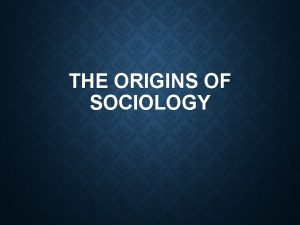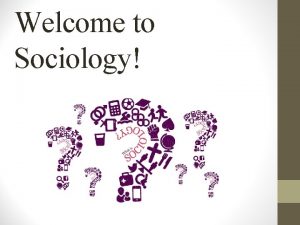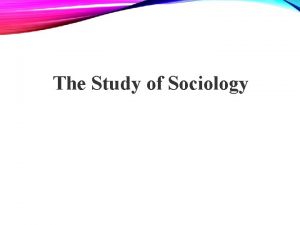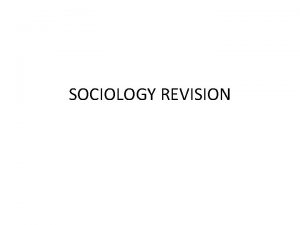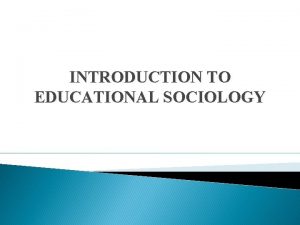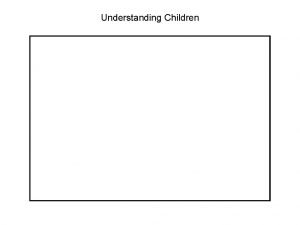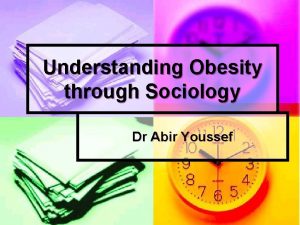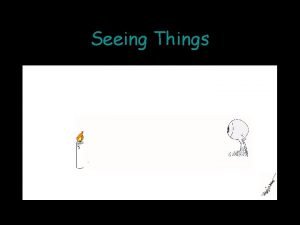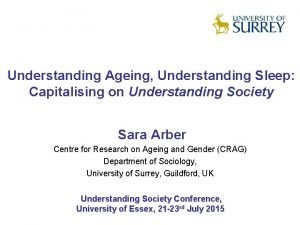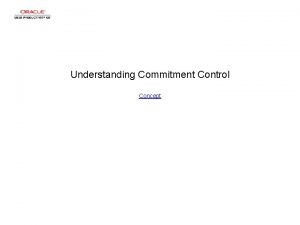Ch 1 Understanding Sociology What Is Sociology Sociology
































- Slides: 32

Ch. 1: Understanding Sociology

What Is Sociology? • Sociology - scientific study of social behavior and human groups • Focus on: – How relationships influence people’s attitudes and behavior – How societies develop and change

The Sociological Imagination • C. Wright Mills’s sociological imagination: – Awareness of the relationship between an individual and the wider society – Ability to view society as an outsider would – Looks beyond limited understanding of human behavior

Sociology and the Social Sciences • Science - body of knowledge obtained by methods based on systematic observation – Natural science - study of physical features of nature and the ways they interact and change – Social science - study of social features of humans and the ways they interact and change

• Studies the influence that society has on people’s attitudes and behavior – Seeks to understand ways in which people interact and shape society – Examines social relationships scientifically • • • Global recession Marital patterns Recession’s impact on education Virginia Tech Hurricane Katrina

Sociology and Common Sense • Sociologists do not accept something as fact because “everyone knows it” – Each piece of information must be tested, recorded, and analyzed • False assumption that women tend to be chattier than men • False assumption of higher crime rates in communities on the Texas-Mexico border

Table 1 -1: Sections of the American Sociological Association Source: American Sociological Association 2014.

What Is Sociological Theory? • Theory - set of statements that seeks to explain problems, actions, or behavior – Effective theories have explanatory and predictive power • Durkheim suicide studies: suggested suicide related to group life – Theories are not final statements about behavior

The Development of Sociology • Philosophers/religious authorities of ancient and medieval societies made observations of human behavior • European theorists in 19 th century made pioneering contributions to development of the science of human behavior

Early Thinkers • Auguste Comte (1798– 1857) – Systematic investigation of behavior – Coined term “sociology” • Harriet Martineau (1802– 1876) – Studied social behavior in Britain and US – Emphasized impact of economy, law, trade, health, and population on social problems • Herbert Spencer (1820– 1903) – Controversially proposed “evolution” in society

Émile Durkheim (1858– 1917) • Behavior must be understood within larger social context – Developed a fundamental thesis to help explain all forms of society • Anomie - loss of direction felt in a society when social control of individual behavior becomes ineffective • Did not limit interests to one aspect

Max Weber (1864– 1920) • To comprehend behavior, one must learn subjective meaning people attach to actions – Verstehen - understanding; insight – Ideal type - construct for evaluating specific cases – Émile Durkheim and Max Weber never met and probably were unaware of each other’s existence

Karl Marx (1818– 1883) • Society divided between two classes that clash in pursuit of interests – Worked with Friedrich Engels – The Communist Manifesto • Working class should overthrow existing class system – Emphasized group identification and associations that influence one’s place in society

W. E. B. Du. Bois (1868– 1963) • Among the early Black sociologists struggling for racially egalitarian society • Knowledge essential in combating prejudice • In-depth studies of urban life – Focused on religion at community level • Double consciousness - division of individual’s identity into two or more social realities

Twentieth-Century Developments • Charles Horton Cooley (1864– 1929) – Used sociological perspective to examine face-to -face groups • Jane Addams (1860– 1935) – Combined intellectual inquiry, social service work, and political activism – Co-founded Hull House

• Robert Merton (1910– 2003) – Combined theory and research – Developed dominant theory of deviant behavior – Advocated bringing together two approaches: • Macrosociology - concentrates on large-scale phenomena or entire civilizations • Microsociology - stresses study of small groups, often through experimental means

• Pierre Bourdieu (1930– 2002) – Capital sustains individuals and families from one generation to the next – Cultural capital - noneconomic goods reflected in knowledge of language and arts – Social capital - collective benefit of social networks

Figure 1 -1: Contributors to Sociology Source: Developed by author.

Major Theoretical Perspectives • Functionalist perspective • Conflict perspective • Interactionist perspective

Functionalist Perspective • Emphasizes the way parts of a society are structured to maintain its stability – Talcott Parsons (1902– 1979) • Viewed society as vast network of connected parts • Each helps maintain the system as a whole

• Manifest and Latent Functions – Manifest functions - open, stated, conscious functions; intended and recognized consequences of an aspect of society – Latent functions - unconscious or unintended functions; may reflect hidden purposes • Dysfunctions – Elements or processes of society that may disrupt a social system or reduce its stability

Conflict Perspective • Assumes social behavior best understood in terms of conflict or tension between competing groups • The Marxist View – Conflict is part of everyday life in all societies – Conflict theorists interested in how institutions may help maintain privileges of some groups and keep others subservient

• The Feminist Perspective – Feminist perspective - sees inequality in gender as central to all behavior and organization – Often allied with conflict theory – Proponents tend to focus on macro level – Contemporary feminist theorists often view women’s subordination as inherent in capitalist societies

• Queer Theory – Queer theory - the study of society from the perspective of a broad spectrum of sexual identities, including heterosexuality, homosexuality, and bisexuality – Foucault: what is regarded as normal or even acceptable human sexuality varies dramatically from by culture and time period – Important influence of gay, lesbian, and bisexual voters in 2012 presidential election

Interactionist Perspective • Generalizes about everyday forms of social interaction to explain society as a whole – Humans viewed as living in a world of meaningful objects – Nonverbal communication - includes gestures, facial expressions, and postures – Manipulation of symbols seen in dress codes

• George Herbert Mead (1863– 1931) – Regarded as founder of interactionist perspective – Work encouraged many sociologists to focus more on micro-level societal behavior • Erving Goffman (1922– 1982) – Dramaturgical approach - people seen as theatrical performers

The Sociological Approach • Gains broadest understanding of society by drawing on all major perspectives, noting where they overlap or diverge – Each perspective offers unique insights into the same issue • Researcher’s work always guided by his or her theoretical viewpoint

Table 1 -2: Major Sociological Perspectives

Taking Sociology With You • Two growing fields allow application to real -world settings: – Applied sociology – Clinical sociology • Developing a sociological imagination is key to thinking like a sociologist

Applied and Clinical Sociology • Applied sociology - use of sociology with intent of yielding practical applications for human behavior and organizations • Clinical sociology - facilitating change by altering social relationships or restructuring social institutions • Basic sociology - seeks profound knowledge of fundamental aspects of social phenomena

Developing a Sociological Imagination • • Theory in Practice Research Today Our Wired World Thinking Globally – Globalization - worldwide integration of govt. policies, cultures, social movements, and financial markets through trade and the exchange of ideas

• The Significance of Social Inequality – Social inequality - condition in which members of society have differing amounts of wealth, prestige, or power • Perhaps the dominant theme of sociological analysis today • Speaking across Race, Gender, and Religious Boundaries • Social Policy throughout the World
 Sociology understanding and changing the social world
Sociology understanding and changing the social world Debunking motif definition
Debunking motif definition Iso 26000 7 core subjects
Iso 26000 7 core subjects Modbus
Modbus Understanding taxes
Understanding taxes Understanding credit spreads
Understanding credit spreads Understanding certificates of insurance
Understanding certificates of insurance Understanding earth 5th edition
Understanding earth 5th edition Fiscal policy meaning
Fiscal policy meaning Understanding work teams
Understanding work teams Understanding work teams
Understanding work teams Understanding text structure
Understanding text structure Learning target
Learning target What is mythological allusion
What is mythological allusion Social studies 30-2 understanding of ideologies pdf
Social studies 30-2 understanding of ideologies pdf Six facets of light
Six facets of light Understanding strategic management
Understanding strategic management Understanding the scriptures chapter 22 study questions
Understanding the scriptures chapter 22 study questions Miymaths
Miymaths Managing clinical risk
Managing clinical risk How did scientists understanding of cells develop
How did scientists understanding of cells develop Visualizing and understanding neural machine translation
Visualizing and understanding neural machine translation Section 1 understanding our environment answer key
Section 1 understanding our environment answer key Chapter 1 activity understanding street law
Chapter 1 activity understanding street law Chapter 1 understanding health and wellness lesson 2
Chapter 1 understanding health and wellness lesson 2 Chapter 6 understanding the management process
Chapter 6 understanding the management process Johnson and johnson botnet infections
Johnson and johnson botnet infections Understanding stem anatomy
Understanding stem anatomy Let's get connected song
Let's get connected song Understanding by design curriculum
Understanding by design curriculum Understanding the scriptures chapter 5 study questions
Understanding the scriptures chapter 5 study questions Cs 231 n
Cs 231 n Deepening understanding year 5
Deepening understanding year 5
